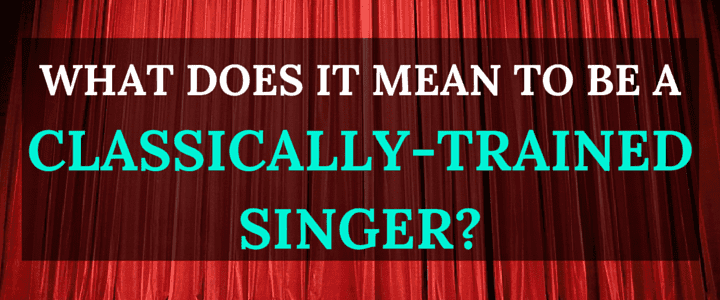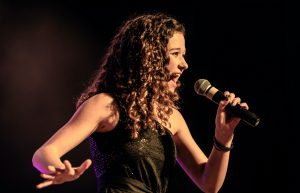What do you think of when you see the words “classical singing?” Perhaps opera comes to mind? Here, vocal instructor Molly R. explains what being classically trained really means and how it can be applied to any genre of singing…
What does the phrase “classically trained” mean – and why does it matter to you as a singer?
Suppose you’re a rock or pop singer looking for a voice teacher — while some teachers may stress that they’re all about rocking or teaching a certain vocal method in their bios, many of them mention being classically trained. With that said, what does it mean to be a classically-trained singer? Will singing classical training help you achieve the sound you want?
I’m a classically-trained singer. I received my degree in vocal performance after studying a healthy diet of art songs, oratorios, and opera arias. Now that I’m a voice teacher, I find myself counting the number of my classical singing students on just one hand! The rest of my students sing commercial music styles — metal, pop, R&B, and others.
The bottom line is that in order to sing healthfully, you should use the classical technique. Although, this is a different ballgame from classical STYLE.
Here’s what you need to know about the “classically trained singer.”
What Does “Classically Trained Artist” Mean?
Any kind of artist can be classically trained – this is a phrase that doesn’t just refer to the classically trained singer.
Simply put, classical art training involves the following:
- Emphasizing core skills over anything else
- Viewing things in context
- Focusing on music performance and technique
- Taking a close look at music history and music theory
- The importance of creative thinking
- Using a systems-based approach to mastering the art of the craft
From a musical perspective, classically trained can be linked to any genre. You could be a classically trained opera singer or a classically trained R&B singer. It doesn’t matter!
As long as you are implementing the key elements above, you can be considered classically trained.
These singers also focus on the idea of ear training, which you can learn more about in this video:
Classical Technique vs. Classical Style
This kind of singing is a lot less complicated than it sounds. To learn this technique, a few things must happen. First, we must breathe and support very low on our bodies – this is coupled with proper balance and posture. Next, we must sing clear, round vowels with an open throat. These are the principles I was most focused on as a young classical singer, tackling songs from the greats like Puccini, Schubert, Barber, and more. Any singing style or genre could surely benefit from these practices, right? That’s exactly right!
Classical style comes from artistic choices you make when you sing. For example, you may choose to be a little breathy in a lower register for a sultry jazz tune, or you may make the sound sassier, brighter, and more “in your face” (literally!) if you’re belting a Broadway song. In rock, we don’t sing the words out nearly as full as we do in an aria — it’s much more conversational.
(Editor’s Note: For more on different styles, check out our Ultimate Guide to Singing Styles and Genres!)
Use a Healthy Mix
Putting together the classical technique with your preferred style is where it’s at, as far as I am concerned! A healthy singing technique and a rockin’ style are the best of both worlds. Don’t assume that all classically-trained teachers won’t welcome other genres, because many of us do! In fact, rock was my first love.
Sharing what I know from the classical world has helped my rocker students feel a lot more confident in their abilities. They’ve mentioned an increase in stamina after long rehearsals and gigs because they breathe and support just like the opera singers do (and those singers have a lot of singing to do — talk about vocal athletes!). They realize they need not scream or push to produce a lot of good sound.
Classical vocal training also stresses the importance of a good warm-up and being mindful of proper vocal hygiene. Although, I wouldn’t suggest sticking to a regimen of solely vocal exercises in lessons. Do spend time doing exercises that cover a variety of vocal skills, including flexibility, diction, breath control, and dynamics. All of these things can and should be applied to your songs, whether they’re classical Mozart arias or metal Judas Priest covers!
Apply Classical Training to Any Genre
I hope these facts will ease your fears about your classically-trained teacher “turning you into an opera singer.” Good teachers are respectful of your preferred styles of music and should never consider turning you into someone you’re not. Quality voice teachers want the best for all of their students and want to ensure many years of healthy singing. The classical technique can do that for you, regardless of the styles you choose to sing.
As an example of a legendary rock star who was classically trained, check out Pat Benatar. She’s still rockin’ and sounding great in her sixties because she was taught solid classical technique on Brahms art songs long before she was a “Heartbreaker”!
Classically-Trained Pop and Rock Singers
A few pop and rock singers have studied the classical technique, believe it or not! In addition to Pat Benatar, Madonna (after she made it big) worked with a teacher on the “24 Italian Songs” to prepare for her role in “Evita.” Lady Gaga worked on classical technique every day for six months to prepare for her big “Sound of Music” medley at the Oscars.
Contrary to popular belief, metal singer extraordinaire Ronnie James Dio did NOT take vocal lessons, but he did say he was greatly influenced by the singing style of tenor and great singer Mario Lanza!
Some other classically trained singers include:
- Ariana Grande
- Freddie Mercury
- Katy Perry
- Charlie Puth
- Ed Sheeran
- Kelly Clarkson
- Annie Lennox
- Elton John
- Jason Derulo
- Bebe Rexha
- Alicia Keys
…and many more!
Do You Need a Degree in Music to Be Considered a Classically Trained Singer?
You don’t need a formal education in order to be considered classically trained. However, it can help.
Taking music history and music theory courses and building your vocal skills (such as the ones you might learn in a Bachelor of Music or other music conservatory degrees) is a great way to understand the fundamentals of singing.
That said, you don’t need to have a four-year degree to get that education. You can easily become a classically trained singer by taking online singing lessons, either on your own or in a group. Even informal singing lessons offer singers a great way to build their fundamental skills.
I can safely say that my classical training has improved my singing across every genre I’ve attempted. It’s the perfect starting point for anyone wanting to learn a healthy and correct singing technique. Apply what you’ve learned from classical training to any genre you want and you’ll be unstoppable! Happy singing!
 Post Author: Molly R.
Post Author: Molly R.Molly R. teaches online and in-person singing lessons in Hayward, CA. Her specialties include teaching beginner vocalists, shy singers, children, teens, lapsed singers, and older beginners. She joined TakeLessons in November 2013. Learn more about Molly here!
Suzy S.







